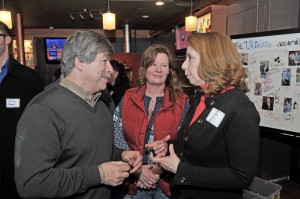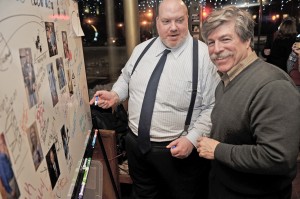
Josh Simpson, a contemporary glass artist from Shelburne Falls, left, and a featured guest speaker at a recent Plug Into the Creative Valley networking event at Clemenza’s, chats with Jennifer Dorgan, center, of Piece of My Art, and Andrea York, right, of Andrea York Photography. More than 25 local business owners were in attendance for a preview of “The Universe According to Josh Simpson,” a citywide art exhibit that will be staged from June 27 – October 18, 2014. (File photo by Frederick Gore)
HOLYOKE – An announcement was made Thursday at Holyoke’s Open Square complex, designating a network that will help creative economy businesses grow and prosper in the Pioneer Valley.
Creative economy businesses in western Mass. will now get help increasing their visibility, recruiting talent, finding appropriate space, borrowing capital and expanding, under a new partnership between businesses, academic institutions, organizations and individuals.
The announcement was made at Big Voodoo Interactive, a company that develops websites for law firms and is based in Open Square.
Big Voodoo founder James Fitzgerald said he chose to open in Holyoke and not Hartford because of the type of talent found in the Pioneer Valley, though a smaller employment pool than that found in greater Hartford.

State Sen. Donald Humason Jr., left, prepares to autograph a whiteboard while chatting with Josh Simpson, a contemporary glass artist from Shelburne Falls, and a featured guest speaker at a recent Plug Into the Creative Valley networking event at Clemenza’s. A special art exhibit featuring the works of Simpson will be staged June 27 – October 18, 2014 as part of a citywide event. (File photo by Frederick Gore)
Massachusetts Creative Economy Industry Director Helena Fruscio explained what exactly a creative economy sector looks like.
There four parts of a creative economy, the first being cultural institutions, such as museums and theater companies; the second being arts organizations which produce creative services or creative goods, such as advertising or marketing; the third involves all of the individual artists; and lastly the creative communities where these businesses and creative professionals reside.
“The Creative Economy Network is reaching out to cater to the needs of all of these four aspects,” Fruscio said. “We’re here with a regional strategy to tailor fit to the needs of the community.”
“It started by a listening tour all across the state, involving over 500 creative companies,” she said.
As different businesses gave their input, certain needs were highlighted as common trends. Many said that they would like assistance with business networking and gaining a broader clientele. Another shared need was to have better access to capital and to remove barriers by means of increasing visibility to the public. Access to talent was also a vital component and the key to being a competitive business. Space was also an issue.
“It’s important to tie space issues to a specific region,” said Fruscio. “Sometimes you have to collaborate, collide, and be in the same room together.”
“Creative businesses help shape the personality and all of the ups and downs of the valley,” said Anne Burke, vice president of the Economic Development Council of western Mass. (EDC), whose mission is to stimulate and facilitate a vigorous regional economy, encouraging and sustaining capital investment and quality job growth.
One of the things that the EDC is advising to businesses is creating a profile on creativeground.org. By signing up and listing a profile, businesses have the opportunity to have a wider range of visibility.
EDC also advocates attending a Plug Into the Creative Valley event. These are monthly meetings where creative businesses get together to connect, collaborate, find new talent, and network.
Burke said the EDC has already hosted networking get-togethers.
In February a Plug Into event was held in Westfield at Clemenza’s Brick Oven Pizza and Café. That night showcased the work of glass artist Josh Simpson.
“The plug in event was awesome and incredible,” said Maureen Belliveau, director of Westfield’s Business Improvement District (BID). “We utilized the event to launch the buzz about Josh Simpson and also as a launch for Westfield’s creative economy team.”
That team in Westfield consists of the Westfield Athenaeum, Westfield on Weekends, the BID, the Chamber of Commerce, Westfield State University and Westfield’s Community Development Department.
The BID is also helping make a more creative community with events like concerts on the Green, and art classes and workshops.
“Creative businesses are a huge economic driver,” said Belliveau. “We’re here to develop and create more regional awareness. A creative industry is a giant web. The creative economy isn’t just about the painters and sculptors – it’s about anyone and everyone who is connected to it.”

